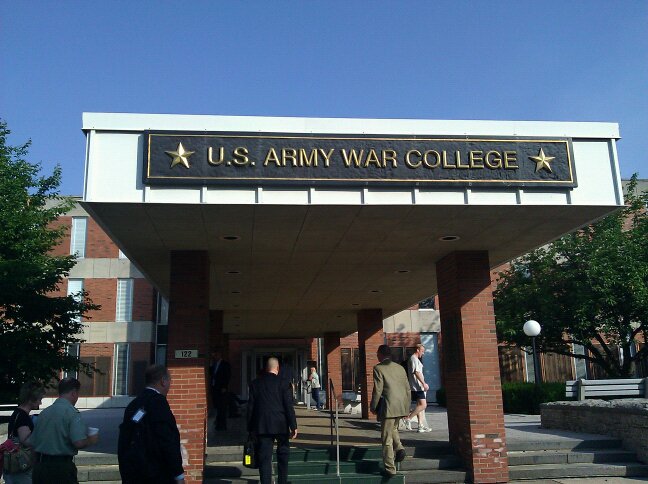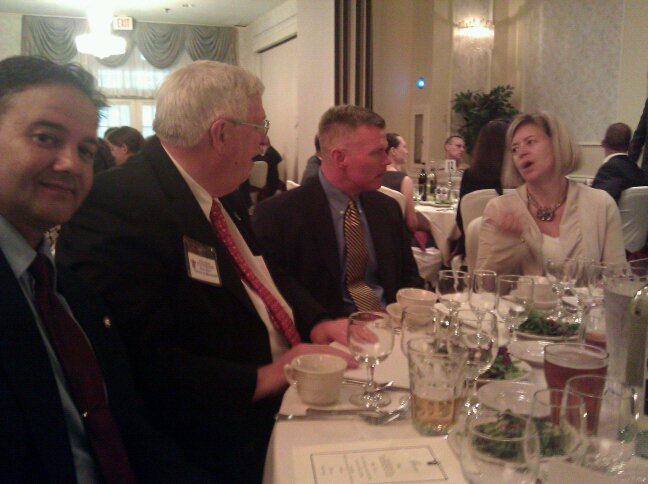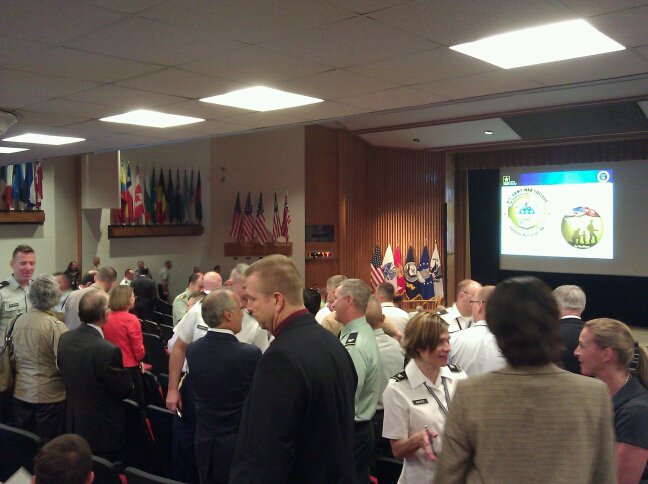The US Army War College National Security Seminar 2011
As noted previously, I was fortunate to attend the National Security Seminar at the the US Army War College this year and wanted to relay my impressions while they were still fresh.
First, in terms of reception and cordiality, I have rarely experienced such an extensive and personal outreach as was demonstrated by the War College staff, faculty, administration and students. Every new member had a “sponsor” – a student, usually a colonel or Navy captain, who acted as a liason and personal guide from the time their plane touched down until the moment they returned to the airport. My sponsor, the former commander of the Wolfhounds, Colonel Richard “Flip” Wilson, whom I consider a friend, really extended himself on my behalf, making me feel welcome and a full member of Seminar Group 20. Most of the students have multiple tours of duty in Iraq and Afghanistan under their belt and many can report the same for the first Gulf War, Panama, Bosnia or Kosovo.
The War College, the Commandant and the Seminar Group all hosted receptions and dinners designed to get students and civilian new members to mix and further discuss issues raised in the seminar sessions or lectures. At these events I had the opportunity to meet and talk to the leadership of the Army War College including the Commandant Major General Gregg Martin, the Deputy Commandant for International Affairs, Ambassador Carol Van Voorst, the Executive Director of the Army Heritage Foundation, Mike Perry, the Director of SSI, Dr. Douglas Lovelace, the Chief of Staff and numerous faculty and seminar members. The New Members such as myself were exceedingly well fed at these events as I suspect the Army was attempting to prove that it really does march on it’s stomach.
The serious business of the National Security Seminar was divided into two segments, the talks given by distinguished speakers to the entire class of 2011 and the New Members and the Seminar Group sessions of approximately twenty students, New Members, academics and foreign visitors. We received a brief on the war in Afghanistan from the ISAF Chief of Staff, who was standing in last minute for General Petraeus who was called to meet with senior adminstration officials; and a very interesting concluding talk by Foreign Affairs Editor Gideon Rose, author of How Wars End, which covered issues of strategy, grand strategy and the disconnect with policy.
The National Security Seminar is run strictly on a non-attribution basis, in order to encourage candor and frank exchange of views, which handicaps my ability to discuss specifics here. I can say that my views on Pakistan ( which I compared to “North Vietnam” ) riled more than a few people – Pakistan is the only country in the world given 2 exchange student slots at the Army War College at the request of the most senior leadership of the US Army – and several students and faculty members took the time, outside of seminar sessions, to make certain I heard countervailing POV regarding Pakistan’s value as an ally. Other topics included, but were not limited to:
Defense budget cuts and force structure
Narco-cartels in Mexico: Insurgency or No?
Civil-Military Relations
Repeal of DADT
AfPak War
al Qaida and GWOT/US Strategy
COIN
Critical thinking and Leadership
Logistics
Libya and NATO
AWC Strategy Curriculum/Program
What the US public expects from their military
China as a peer competitor
Effects of ten years of war on officer corps/military
Illegal combatants and international law
PTSD
Battle of Gettysburg and Grand Strategy
Cyberwar
Differences in Armed Services strategy, command climate, discipline, leadership
The Arab Spring
US Global leadership and Economics
Interagency Operational jointness
Most of the discussion took place in the seminar groups, with Q&A periods in the mass sessions with featured speakers. I came away deeply impressed with the seriousness and insights as practitioners that AWC students brought to the table. The AWC strategic studies program seeks to broaden students who are assumed to arrive with tactical expertise and prepare them for higher command that carries operational, strategic and even policy responsibilities (at least in terms of interpreting and executing within policy guidelines). Many students were articulating ideas associated with Thomas P.M. Barnett, the “mission order” and “commander’s intent” style of leadership or Clausewitzian strategic premises during debates and discussion.
The National Security Seminar Week was for me, an enlightening and exceptionally enjoyable experience, one I would highly recommend to readers who may have such opportunities in future years.







June 12th, 2011 at 11:59 pm
There is a problem viewing this post with iE that I am trying to fix – Safari, Chrome and Firefox are ok, if the distorted page is bothersome…..
June 13th, 2011 at 1:55 am
Zen, It works fine with Safari—just wish Safari worked as well with WordPress:)) Sounds like a great week, and I’m glad we had you there!
June 13th, 2011 at 2:26 am
that’s a broad range of topics to cover!
I can’t help but think that there are others who think the same that you do of Pakistan. I’m glad you went, and they need a differing point of view –0therwise, what’s the point?
More outsiders = a good thing.
June 13th, 2011 at 2:40 am
Nice. How’d India fare?
June 13th, 2011 at 3:50 am
Thanks guys!
.
The AWC is a very pro-Pakistan place, which I think reflects the beliefs of senior Army leadership/DoD. A charitable view would be that they are emphasizing the legitimate point that cooperation with the US causes domestic problems in Pakistan; a less benevolent interpretation is that there is a party line in effect to the point that they do not realize the American public largely thinks ill of Pakistan (and with good reasons). India was mentioned only in either this context, or as a balancer to China. I honestly do not think India is all that much on the Army’s radar, I suspect the Navy might have other views.
June 13th, 2011 at 12:53 pm
"….cooperation with the US causes domestic problems in Pakistan."
.
So what? How can such brave men and women of action not see that for the obvious ploy that is? How can such brave men and women of action not look beyond the mere tactical cooperation to the larger culture and the larger history? There are books and books and books that discuss the phenomenon of Westerners and South Asians interacting with one another, and the curious emotional places that the interaction takes people.
.
Hmmm. That didn’t come out very nicely, did it? I don’t mean harm or to insult. I am fascinated, frankly, by this strange institutional phenomonen to which so many are blind.
.
Not the civilians, though. There is a running conversation going on at Small Wars Journal between about three of us (one, a Pakistani American has essentially dropped out. I don’t think he could take pointing out the obvious and being rebuffed, anymore) that goes in circles over this issue.
.
So interesting. It is a bigger problem that Pakistan, you know. Institutions who tell themselves fibs cannot solve problems and our institutions, civilian and military, go around and around because their core assumptions are just plain wrong a lot of the time.
.
Know yourself…..
.
– Madhu
.
: ) One of my crazy theories, of course. Thanks for letting me yammer on about them over here.
June 13th, 2011 at 12:59 pm
The Pakistani capital, Islamabad, is an architectural expression of the state’s artificiality. Not even built until after 1947, it is an Asian Brasília, with wide and impersonal boulevards connecting great palaces of bureaucracy. Its street names are ciphers of numbers and letters. It is also very handy to Rawalpindi, the headquarters garrison town of the Pakistani armed forces. Anyone wanting to mount a coup has only to drive his tanks a few blocks. Pakistan has been a fiefdom of the military for most of its short existence: as was once said of Prussia, it is not a country that has an army but an army that has a country. (On roadsides and at traffic circles, the typical monuments are tanks or fighter planes set in concrete, or replicas of the mountain under which Pakistan’s first nuclear device was detonated.) In Rawalpindi itself, the genial regimental atmosphere of the British days— symbolized by the aptly named Flashman’s Hotel—is now somewhat overlaid by the signs of influence from West Point and Langley. The ISI, originally set up in 1948 by a British officer named Major General Cawthorne, who “stayed on” after partition, has more recently become an expensively Americanized apparatus.
.
Christopher Hitchens in Vanity Fair, 2002.
.
Americans do not realize, at times, how they are watched and mirrored and mimicked and reflected. Growing up in the States with Indian parents taught me that. We watch, we practice, we copy, we learn. I don’t mean that in any kind of negative way at all.
.
First, start with human nature. That’s what I think but it probably comes from reading too many novels (and my second choice in medical school was psychiatry. Still fascinated 🙂 )
.
http://www.vanityfair.com/politics/features/2002/01/pakistan-200201?currentPage=2
.
– Madhu
June 13th, 2011 at 1:00 pm
Too bad we weren’t able to link up.
June 13th, 2011 at 2:17 pm
Sounds great, Mark.
June 13th, 2011 at 4:17 pm
Hey Big Steve,
.
Agreed! I inquired about you with Dr. Lovelace – had a nice conversation with him BTW – he said you were not going to make it. We could have knocked back a few together
June 13th, 2011 at 7:09 pm
Hi Madhu, Understand your sentiments, I believe, but I’m not sure "how" American’s could become self-aware (collectively, speaking) about our habits and culture and the perceptions around the world, when we seem, as a group to be indifferent to the internal damage done by our increasingly debased "culture." There is too much lowest common denominator stuff in our media, and depressingly willing consumers thereof. Rant over, but what we broadcast to the world in our entertainment industry is, more often than not, embarrassing.
June 14th, 2011 at 12:44 pm
Now, don’t get me started….
.
Went to see My Man Godfrey on the big screen and the entire audience (a surprising and pleasing number of young hipsters) was spellbound.
.
There must have been some digital retouching or something because it looked amazing. So different from the muddy tv black and white I remember. This version, still black and white, took everyone back to the original time when films like this appeared regularly in our theaters.
.
Man, could that crew back then make movies.
.
– Madhu